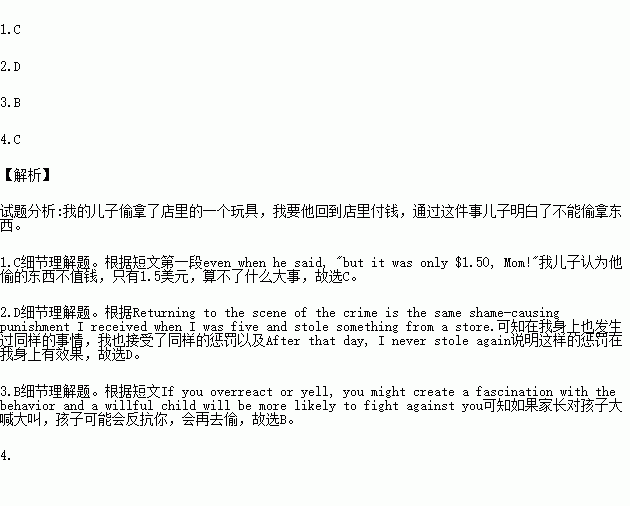题目内容
Over the holidays, I took my three young children into a fancy chocolate shop to buy gifts. Halfway home, I noticed my 7-year-old son playing with a plastic noisemaker. Long story short: He had stolen the toy. I kept my cool -- even when he said, "but it was only $1.50, Mom!" --and explained why it was unacceptable to take things we didn't buy.
A few hours later, I marched my son back to the store with two dollars from his piggy bank. He walked embarrassedly to the counter and told the clerk that he had taken something without paying for it, that he was sorry to break it and that he would pay for it now.
I know exactly how terrible he was feeling. Returning to the scene of the crime is the same shame-causing punishment I received when I was five and stole something from a store. 1 remember my dad sending me back to return the item. It remains one of my clearest child- hood memories. After that day, I never stole again. My dad taught me such an important lesson 30 years ago and I saw an opportunity to do the same for my son. But now I wonder if it was the fight thing to do.
"Returning to the store is absolutely the right thing to do," Laura Markham, Ph.D., a child psychologist and author of Peaceful Parent, Happy Kids, says. "Many children steal -- they' re not born knowing the rules so it' s our job to teach them."
And stay calm when you set them. "If you overreact or yell, you might create a fascination with the behavior and a willful child will be more likely to fight against you," she says. Having a child physically return the stolen item helps him or her grasp the situation -- and the consequence.
But don't talk about it for too long. "lf you continuously bring up the incident, the child will believe they' re a thief and that they' re bad," she says.
Only time will tell if this experience will have the same powerful effect on my son as it had on me, but at the same time I can rest if I haven' t dealt with the situation badly.
1.When the author' s son was caught playing with a stolen toy, he________.
A. responded calmly
B. felt very ashamed
C. didn't think it was a big deal
D. didn't admit stealing the toy
2.The author punished her son like that because __________.
A. her father asked her to do so
B. it had been popular for 30 years
C. she knew it was the right thing to do
D. the same punishment had worked on her
3.According to Laura Markham, if parents shout at their kids' stealing behavior, the kids may _______.
A. feel frightened
B. steal again
C. think they are bad
D. remember what happened clearly
4.What does the author think of Laura Markham' s words?
A. They are doubtful.
B. They are unacceptable.
C. They help her to stop feeling worried.
D. They have taught her a good lesson.
 暑假作业安徽少年儿童出版社系列答案
暑假作业安徽少年儿童出版社系列答案
